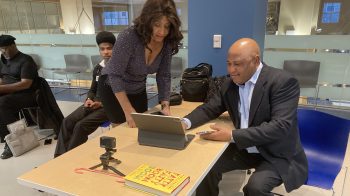Shopaholism linked to other urges
TESS VIGELAND: Easter is next weekend. And you know what that means, one more week of walking past that expanded candy section right at the front of the grocery store, and trying not to buy any marshmallow Peeps. According to a new study, though, the more you struggle to control your inner peepaholic or shopaholic, the more you could be vulnerable to other urges down the line. Here to explain is the co-author of that study. Ron Faber is a professor and consumer researcher at the University of Minnesota. Mr. Faber, thanks for coming in.
RON FABER:
Well, thank you. It’s my pleasure to be here.
VIGELAND:
Talk to me a little bit about how you conducted these experiments. What did you ask your subjects to do?
FABER:
We do two different tasks. In the first task, we make people use up what are known as self-regulatory resources.
VIGELAND:
By this you mean depleting, their, their ability to say no?
FABER:
Yes. They have to pay attention to something. They have to behave in some way. They might have to think about something. And all of these reduce our resources to be able to exert self-control. The second task involved assessing impulse buying. And our basic idea was that if you use up these resources that you need to engage in control of your behavior or your spending, that you will then have a harder time and you will spend more.
VIGELAND:
This sounds very much like the advice that you get all the time in dieting. That you can’t deny yourself everything because, otherwise, you won’t deny yourself anything.
FABER:
That’s true. And, in fact, if you’re on a diet, it’s harder to avoid impulse buying.
VIGELAND:
Really?
FABER:
Yes.
VIGELAND:
Now, how does that work?
FABER:
Well, we think that people have just one basic set of resources that they use for control. And we have all sorts of goals in our life. And in order to maintain those goals, we have to exert control to not do other things that would take away from these. And as we exert control in one area of our life, we’re less able to do it in some other areas or in some other situation. But this is a short-term thing. And so if we wait five, 10 minutes, then our resources are replenished.
VIGELAND:
Minutes?
FABER:
Yeah, fairly short.
VIGELAND:
So what does that tell us about how our brain works when we’re, when we’re out shopping?
FABER:
I think it basically says, the more decisions we have to make, the more stress we are under, the less able we are to exert control. And it tells us that if we’re trying to save money, we might wanna do things like, not go shopping right after we’ve had a very hectic day. Or we may not want to buy lots in a long period of time. So you may not wanna go shopping for two or three hours, but instead, go in several shorter shopping trips.
VIGELAND:
All right. Ron Faber is the co-author with Kathleen Vohs of a paper entitled Spent Resources. And you can find that in the latest Journal of Consumer Research. Thank you so much for coming in.
FABER:
My pleasure.
There’s a lot happening in the world. Through it all, Marketplace is here for you.
You rely on Marketplace to break down the world’s events and tell you how it affects you in a fact-based, approachable way. We rely on your financial support to keep making that possible.
Your donation today powers the independent journalism that you rely on. For just $5/month, you can help sustain Marketplace so we can keep reporting on the things that matter to you.


















